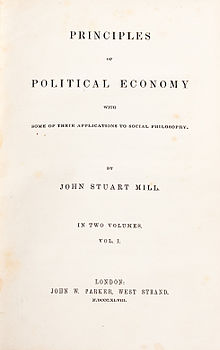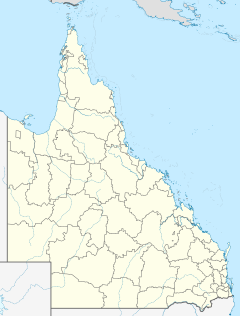Principles of Political Economy
 Cover first edition, 1848 | |
| Author | John Stuart Mill |
|---|---|
| Country | United Kingdom |
| Language | English |
| Subject | Political philosophy |
| Genre | Nonfiction |
| Publisher | John W. Parker |
Publication date | 1848 |
| Media type | |
| Pages | 450 |
| Text | Principles of Political Economy at Wikisource |
Principles of Political Economy (1848) by John Stuart Mill was one of the most important economics or political economy textbooks of the mid-nineteenth century.[1] It was revised until its seventh edition in 1871,[2] shortly before Mill's death in 1873, and republished in numerous other editions.[3] Beside discussing descriptive issues such as which nations tended to benefit more in a system of trade based on comparative advantage (Mill's answer: those with more elastic demands for other countries' goods), the work also discussed normative issues such as ideal systems of political economy, critiquing proposed systems such as communism and socialism.[4] Along with A System of Logic, Principles of Political Economy established Mill's reputation as a leading public intellectual. Mill's sympathetic attitude in this work and in other essays toward contemporary socialism, particularly Fourierism, earned him esteem from the working class as one of their intellectual champions.
Preface and Preliminary Remarks
Mill's Principles were written in a style of prose far flung from the introductory texts of today. Devoid of the mathematical graphs and formulae that were only developed after his death, principally by Alfred Marshall, Mill wrote with the rich tone of grandeur that is found in all his books. His book continued to be used well into the twentieth century as the foundational textbook, for instance in Oxford University until 1919.
Book I Production
Mill explores the nature of production, beginning with labour and its relationship to nature. He starts by stating, that the "requisites of production are two: labour, and appropriate natural objects." A discussion follows of man's connection to the natural world, and how man must labour to utilise almost anything found in the natural world. He uses a rich array of imagery, from the sewing of cloth, to the turning of wheels and the creation of steam. Man has found a way to harness nature, so that "the muscular action necessary for this is not constantly renewed, but performed once for all, and there is on the whole a great economy of labour." He then turns on the view of who "takes the credit" for industry. "Some writers," he says,
"have raised the question, whether nature gives more assistance to labour in one kind of industry or in another; and have said that in some occupations labour does most, in others nature most. In this, however, there seems much confusion of ideas. The part which nature has in any work of man, is indefinite and incommensurable. It is impossible to decide that in any one thing nature does more than in any other. One cannot even say that labour does less. Less labour may be required; but if that which is required is absolutely indispensable, the result is just as much the product of labour, as of nature. When two conditions are equally necessary for producing the effect at all, it is unmeaning to say that so much of it is produced by one and so much by the other; it is like attempting to decide which half of a pair of scissors has most to do in the act of cutting; or which of the factors, five and six, contributes most to the production of thirty."
He refers to former French Economists and Adam Smith, who thought land rents were higher because there was more nature being provided. In fact, says Mill, the simple answer is that land is scarce, which is what enables greater rent exaction. He mentions that many things are limited in abundance, for instance, Arctic whale fishing, which could not keep supplied the demand. This alludes to an introductory principle of value, that "as soon as there is not so much of the thing to be had, as would be appropriated and used if it could be obtained for asking; the ownership or use of the natural agent acquires an exchangeable value."
- 비생산적 노동의 III
- IV 오브 캐피털
밀은 "노동 생산물의 축적된 재고"라고 말한다. 비록 그것의 본성은 오해받고 있지만. 그는 생산에 할당된 자산과는 달리 식량의 소비를 예로 든다.
"그렇다면 자본가와 자본가의 구별은 상품과 같은 종류의 상품에 있는 것이 아니라 자본가의 마음 속에 있는 것이다. 그는 그것들을 다른 목적보다는 한 가지 목적에 고용하려는 의지 속에 있는 것이다. 그리고 아무리 노동자의 사용에 적응하지 못하더라도, 모든 재산은 자본의 한 부분이기 때문에 자본의 한 부분 즉, 자본가로부터 받을 가치가 있다.생산적인 재투자를 위해 분리한다."
자본은 노동과 마찬가지로 실업자가 될 수 있으며, 밀은 생산 자본에 대한 비효율적인 과세 사례를 제시한다. 그리고 산업주의에 의해 만들어진 생활수준에 대한 잉여를 관찰한다.
"결국 노동자들의 임금과 임금을 지불하는 데 고용된 국가의 생산 자본의 많은 부분이 생산에 엄격하고 필수적으로 필요한 것은 아니라는 것이 명백하다. 그 중 상당 부분이 실제 생활과 건강의 필요를 초과하는 경우(숙련 노동자의 경우 대개 상당한 초과)는 노동력을 부양하는 데 지출되지 않고 그에 대한 보상에 사용되며, 노동자들은 생산이 완료될 때까지 보상의 이 부분을 기다릴 수 있다. 자본으로서 반드시 미리 존재할 필요는 없다.: 그리고 만약 그들이 불행히도 그것을 완전히 포기해야 한다면, 같은 양의 생산이 일어날지도 모른다. 노동자의 전체 보수가 일상 또는 주간 지급으로 그들에게 앞당겨지기 위해서는 미리 존재해야 하며, 생산적인 사용, 더 큰 주식 또는 자본에 충당되어야 하며, 노동자가 기존의 생산의 범위를 충분히 이어나갈 수 있을 것이다: 노동자가 받는 보상의 양보다 더 크다.신중한 노예주인의 사리사욕으로 그의 노예들에게 할당될 것이다. 사실, 풍부한 자본이 이미 축적된 후에야 겨우 생계수단을 넘어서는 노동의 어떤 보수도 미리 지불하는 관행이 일어날 수 있었을 것이다: 그렇게 지불된 것은 무엇이든지 생산에 실제로 적용되는 것이 아니라 생산적인 노동자들의 비생산적인 소비에 적용되어, 생산적인 노동자들을 위한 기금을 나타내는 것이기 때문이다.습관적으로 일부분을 단순한 편의상 전용했다는 것을 충분히 인정할 수 있다."
- 자본을 존중하는 V 기본 제안
- 순환자본과 고정자본의 VI
- VII 생산 에이전트의 생산성 정도에 따라 달라짐
- 협력의 VIII 또는 노동 조합
- 대규모 생산 및 소규모 생산의 IX
- 노동력 증대의 법칙 X
- 자본증식법률의 XI
- 토지생산증대법률의 XII
- 전술한 법률의 결과 XIII
제2권 배포
- I Of Property
- II 같은 과목이 계속되었다.
- 생산물이 유통되는 계층의 III
- IV Of Competition and Custom
- 노예의 V
- 농민 6세
- VII 동일 과목의 계속
- 메타이어스의 8세
- 코티어의 IX
- X Cottier Tenancy 폐지 수단
- 임금의 XI
- 저임금에 대한 대중적 구제책의 XII
- XII 저임금에 대한 구제책은 추가로 고려되었다.
- 고용형태별 임금격차 XIV
- 수익의 XV
- 렌트 16세
제3권거래소
밀은 그의 세 번째 책에서 데이비드 리카도의 비교우위론에 의해 해결되지 않은 문제들 중 하나를 다루었는데, 즉 무역의 이득이 누구에게 분배되었는가 하는 것이다. 밀의 대답은 국제 무역이 상품에 대한 수요가 가장 탄력적인 대부분의 나라에 혜택을 주었다는 것이었다. 밀이 공산주의와 사회주의를 자본주의의 대안으로 여기는 것도 이 세 번째 책, 특히 제1장에서이다.
- I Of Value
- II 수요와 공급, 가치 관련
- III 생산원가, 가치와 관련 비용
- IV 궁극적 생산원가 분석
- 임대 V, 가치와 관련
- VI 가치 이론 요약
- 7세 오브 머니
- 수요와 공급에 의존하는 화폐 가치의 VIII
- 생산원가에 따라 달라지는 화폐 가치의 IX
- 더블 스탠더드와 자회사 코인의 X
- XI Of Credit, 돈의 대용품
- XII 신용이 가격에 미치는 영향
- XIII의 변변한 지폐
- 공급 과잉 XIV
- 가치 측정값의 XV
- 몇몇 독특한 가치 사례 중 16세
- 국제 무역의 XII
- 국제 가치의 XIII
- 수입 상품으로 간주되는 XIX Of Money
- 외국거래소의 XX
- 상업계를 통한 귀금속 유통 XXI
- 외환 및 무역에 미치는 통화의 영향
- 이자율의 XXIII
- 전환화폐 규제의 XXIV
- 같은 시장 다른 나라들의 경쟁의 XXV
- Exchange의 영향을 받는 배포의 XXVI
제4권 사회진보가 생산과 유통에 미치는 영향
밀은 그의 네 번째 책에서, 특히 한 가지 결과를 예측하기 보다는 여러 가지 가능한 미래 결과를 제시했다. 첫째는 맬더스 노선에 이어 인구가 물자보다 빠르게 증가해 임금 하락과 이익 상승으로 이어졌다. 스미스의 말에 따르면, 인구보다 더 빨리 축적된 자본이 증가하면 실질 임금이 상승할 것이라고 한다. 셋째, 데이비드 리카도를 반영하여 자본이 축적되고 인구가 같은 속도로 증가하지만, 기술이 안정적으로 유지된다면, 노동에 대한 수요와 공급이 같기 때문에 실질 임금에는 변화가 없을 것이다. 그러나 인구가 증가함에 따라 토지 이용이 증가하고, 식량 생산 비용이 증가하며, 따라서 이윤이 감소할 것이다. 네 번째 대안은 인구보다 기술이 더 빨리 발전하고 자본주식이 늘어난다는 것이었다. 그 결과는 번영하는 경제가 될 것이다. 밀은 세 번째 시나리오가 가장 그럴 것 같다고 느꼈고, 그는 첨단 기술이 언젠가는 끝나야 할 것이라고 생각했다.[5] 그러나 경제활동이 계속 강화될 것이라는 전망에 대해 밀은 더 양면적이었다.
"나는 인간의 정상적인 상태가 타려고 발버둥치는 것이라고 생각하는 사람들이 내세우는 삶의 이상에 매료되지 않았다는 것을 고백한다; 현존하는 사회생활의 형태를 이루는 서로의 발뒤꿈치를 짓밟고 짓누르고 팔꿈치를 밟고 밟는 것이 가장 바람직한 인간종류, 아니 그 어떤 것이라도 불쾌한 동정심 이외에는 결코 마음에 들지 않는다.산업 진보의 한 단계 중 하나인 [6]토스
- I 진보적 부국가의 일반적인 특징
- II 산업과 인구의 발전이 가치와 가격에 미치는 영향
- III 산업 및 인구의 발전이 임대료, 수익 및 임금에 미치는 영향
- IV 최소 수익률 추세
- 수익성향이 최소로 나타난 V의 영향
- 정지 상태의 VI
- VII 노동계급의 장래성 전망
정부의 영향에 관한 5권
그의 다섯 번째 책에서 밀은 필요한 과제, 정부의 존립에 필수적인 과제, 그리고 실행될 경우 틀림없이 대중에게 이익이 될 선택적인 과제들을 통해 사회 내 자유를 지탱하는 정부의 역할을 설명했다. 언급된 필요한 과제는 침략으로부터 시민 보호, 가정생활의 안전, 사유재산 및 그것이 생산하는 자원에 대한 규제 등이다.[7] 그는 정부가 경제 문제에 개입할 때 신중해야 소비자와 생산자 사이의 무역 자유에 대한 자연스러운 수요를 방해하지 않을 수 있다고 말한다. 그는 오랫동안 지속되어온 보호주의의 부정적인 영향을 언급할 때 이 점을 다시 언급한다. 그러나 그는 보조금 지원을 통한 시장 확대 및 유지, 등대 건설 등 정부 개입의 잠재적 이익에 대해서도 언급하고 있다. 이것들은 현대 경제학의 공공재와 외부성의 예들이다. Mill은 시장이 특정한 사회적 문제를 해결하지는 못하지만, 정부는 시장 내 개입에서 진보와 자유를 모두 지켜야 한다고 말한다. 밀은 그의 다른 작품인 "특히 자유에 대하여"(1859년)와 마찬가지로 정부 활동이 사회에 이롭고 개인의 자유를 침해하지 않는 한 정당하다고 주장한다.
밀은 자신의 이상적인 과세 체계를 논의하면서, 낮은 한도에서 소득자보다 적은 소득자에게 면제를 주는 비례 과세의 트윗 버전을 홍보한다. 제5권에서는 현대 세제개혁 논쟁에서 세출세의 유용성에 대한 논쟁으로 변질된 '이중과세'라는 구시대적 발상을 다룬다.[8]
- I OF Government of Government in General
- II On the General Principles of Taxation
- III Of Direct Taxes
- IV Of Taxes on Commodities
- V Of some other Taxes
- VI Comparison between Direct and Indirect Taxation
- VII Of a National Debt
- VIII Of the Ordinary Functions of Government, considered as to their Economical Effects
- IX The same subject continued
- X Of Interferences of Government grounded on Erroneous Theories
- XI Of the Grounds and Limits of the Laisser-faire or Non-Interference Principle
Reception
In 1856, this book was included in the Index Librorum Prohibitorum, thus being banned by the Catholic Church.[9]
See also
- Essays on Some Unsettled Questions of Political Economy (1844) John Stuart Mill
- Critique of political economy
Notes
- ^ See Mill, John Stuart (1848), Principles of Political Economy with Some of their Applications to Social Philosophy, 1 (1 ed.), London: John W. Parker, retrieved 7 December 2012, volume 2 via Google Books
- ^ See Mill, John Stuart (1871), Principles of Political Economy with Some of their Applications to Social Philosophy, 1 (7 ed.), London: Longmans, Green, Reader & Dyer; Mill, John Stuart (1871), Principles of Political Economy with Some of their Applications to Social Philosophy, 2 (7 ed.), London: Longmans, Green, Reader & Dyer, retrieved 5 June 2014, via Archive.org
- ^ Mill, John Stuart (1888), Principles of Political Economy with Some of their Applications to Social Philosophy (6 ed.), London: Longmans, Green, Reader & Dyer, retrieved 5 June 2014, via Archive.org
- ^ Capaldi, Nicholas (2004). John Stuart Mill: A Biography. Ch. 5: Worldly Success (1846–1850): Cambridge University Press. pp. 214 to c. 234. ISBN 978-0-511-16419-4.CS1 maint: location (link)
- ^ Pressman (2006) 45
- ^ Mill (1871) Book 4, Chapter 6
- ^ Mill, John Stuart (1848). Principles of Political Economy with Some of their Applications to Social Philosophy. London: John W. Parker.
- ^ Sandmo, Agnar (2011). Economics Evolving: A History of Economic Thought. Princeton University Press.
- ^ "BFE - Censored publications - Search result". search.beaconforfreedom.org. Retrieved 10 July 2020.
References
- Hollander, Samuel (1985) The Economics of John Stuart Mill, University of Toronto Press
- Pressman, Steven (2006) Fifty Major Economists, Routledge, ISBN 0-415-36649-6
- Schwartz, Pedro (1972) The New Political Economy of J.S. Mill, Duke University Press
External links
| Wikimedia Commons has media related to Principles of Political Economy (1848). |
- Principles Of Political Economy by John Stuart Mill, (illustrated 1884 edition) on Project Gutenberg (online version and in PDF format.); attractively formatted, easily searchable version of the work.


